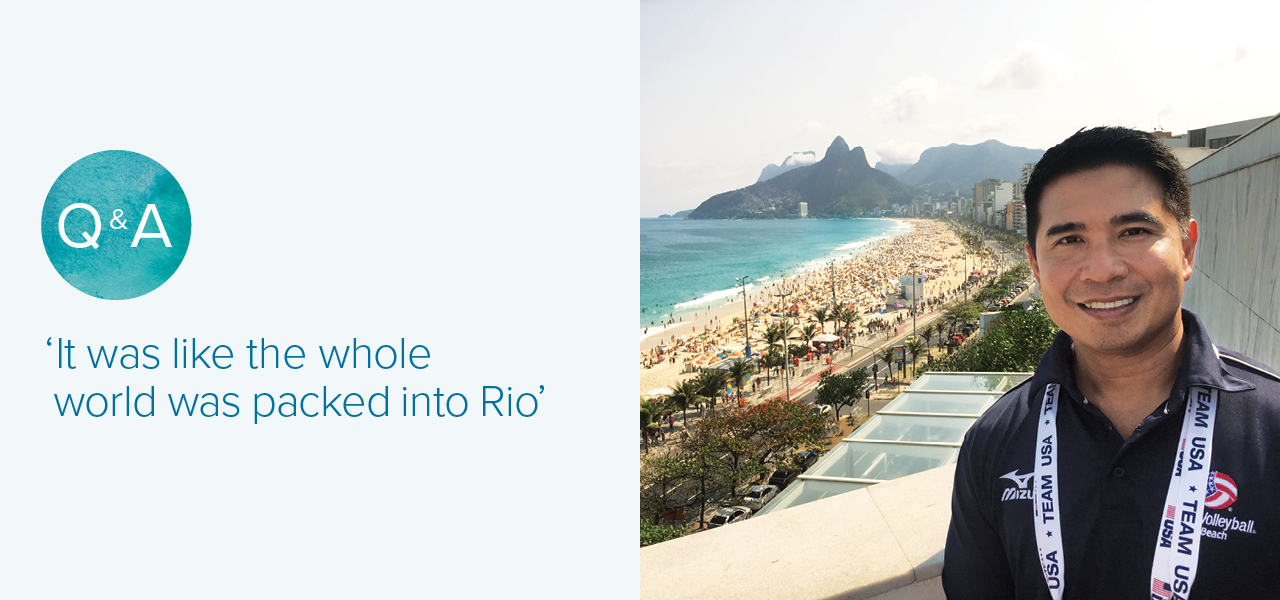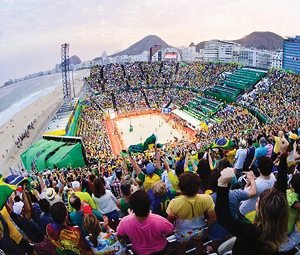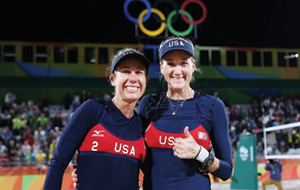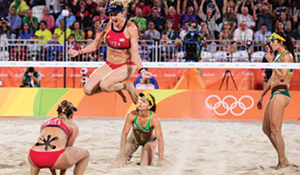Elmo Agatep (M.D. ’02) served as team physician for the bronze-winning U.S. beach volleyball team at the 2016 Summer Olympics in Rio de Janeiro, and will also support U.S. water polo at world championships in Shanghai.
Q. I’ve read that being an Olympic team doc is very rewarding but can also be very grueling — even in Rio. What were some of the ups and downs of the overall experience for you?
A. There’s certainly a lot of pride in helping to care for athletes representing your country in our largest global sporting event next to the soccer World Cup. It’s an awesome, humbling experience, and you really gain appreciation for all the hard work and sacrifices the athletes make for our national pride. There’s also the satisfaction that comes with having a career-highlight experience like going to the Olympics.
The accommodations and food were another highlight. Our delegation stayed in a Copacabana hotel rather than the athlete’s village, and during the rare downtime I took the opportunity to explore the famous Copacabana and Ipanema beaches. I met some locals who took me surfing at Ipanema, which was a blast! I attended some of the other Olympic events, and we tried to eat our way through Rio and take advantage of their seafood and churrascaria (Brazilian-Argentinian style barbeque) restaurants.
In terms of downsides, there were the long and variable work hours. I don’t think I’ve worked this hard since residency (laughs). The time away from family was emotionally taxing, and so was the stress of being away from my practice – as you can imagine there were patient-management issues, studies to follow up on, communication delays… .
Q. Can you describe a “typical” day at the Olympics, if there is such a thing?
A. Unlike many of the teams that went to Rio, beach volleyball was somewhat unique in that we were responsible for the care and management of four teams of two players, each with different training schedules, regimes and game times. Our medical team included an athletic trainer, a chiropractor and myself and we’d split time between each team, making sure one of us was present during training, practice and games.
A typical day includes time in one of the USA training facilities and some court practice, then time for evaluation and treatment. Then one or two providers are usually present at courtside during games at the Copacabana beach arena.
This would have been a tolerable schedule – apart from the fact that several of our teams (namely the team of Kerri Walsh-Jennings and April Ross) were scheduled to play games at midnight or 1 a.m. to coincide with prime time viewing on NBC! So often the medical staff supporting that team wouldn’t get to bed until 4 a.m. after game coverage and treatment. You’d hope to grab four hours of sleep prior to getting up and starting the whole process again. This went on every day for three weeks (sigh).
Q. With more than 10,000 athletes alone from more than 200 countries, what’s it like to be immersed in such a mix of languages and cultures?
A. The time that I got to spend at the Olympic Village and just being around the venues drove home the global draw of the Olympics – it was like the whole world was packed into Rio. Just the cacophony of languages was incredible, and there was an amazing variety of nationalities I got to interact with.
Everyone was so friendly and seemed genuinely interested in getting to know and just conversing with us. People would come up to us to see if we had pins or stickers to give away or trade, and often this led to longer conversations and sometimes sharing a meal or a drink. I left Brazil with many memories and friends from around the world that I still keep in touch with to this day.
Q. You’re interacting with clinicians from all over the world as well?
A. I did get a chance to talk to providers from many countries – and it was interesting to learn that many of the delegations don’t include a medical doctor on their staff. In other parts of the world, athletic care and management is largely the responsibility of physiotherapists, trainers and chiropractors. So during international events these teams often rely on physicians from host nations to assist with medical care. It really made me appreciate our country’s ability to deliver comprehensive care and support.
Q. What kind of athletes do you serve in your regular daily practice in Orange County, and are there big differences between serving amateurs or scholastic players vs. Olympians?
A. At our practice in Seal Beach we serve a really wide spectrum of athletes– from Little Leaguers to high school and collegiate players to the weekend warrior and even the aging athlete. We’re also blessed to have many pro and national teams based nearby, such as USA Water Polo, and my relationships with their athletes, governing bodies and athletic trainers led me to serve as a consulting and team physician.
In many ways the care itself isn’t much different at the Olympic level. The injuries are very similar, and I employ the same treatment strategies for national team members as I do in my clinic. The obvious difference is that the stakes are higher with our national team athletes. The demand on them to always perform at their peak is palpable – and it weighs heavy on their medical team! We bear the onus of keeping them both physically and psychologically healthy.
In that sense, to be effective I’m required to wear many hats, and I’ve developed skill sets that I don’t usually employ in my customary daily clinical practice. For national team athletes, apart from being their doctor I sometimes have to serve as their pharmacologist (to help ensure they didn’t inadvertently use any banned substances), complimentary medicine consultant, nutritionist, physiotherapist and even mental health provider.
Q. Why and how did you come to be involved with the Olympic organization as a team physician?
A. I was covering several USA Volleyball sanctioned events as a fellow. The national governing body became familiar with me and invited me to serve as a covering physician for junior-level traveling teams, and ultimately I was invited to be the team physician.
I’ve always had a special passion for serving athletes – mostly because I “get” them because I used to be one of them. I understand the drive, the sacrifices and pain that they endure to achieve excellence, and also the desperation and need for proper guidance and support when they get injured.
Q. What kind of guidance and support is at play?
A. As an athlete myself I didn’t get the sense that my doctors fully understood or appreciated the mechanism of my injuries, or that they had the nuance outside of technical skills to fully get me rehabilitated and back to competition.
Many also didn’t know how to talk to athletes or gain their trust – which is so important to driving compliance with therapy and helping the patient preserve mental fortitude through the healing process. I wanted to help fill that gap in care.
Q. Why did you choose beach volleyball?
A. “Why not beach volleyball!” is my usual answer. I love the beach! I literally grew up on it. Even now, I surf and chase waves at every opportunity. I love watching and playing volleyball. At Davis I played in many tournaments as an undergrad, but as the level of competition increased I realized that my diminutive size was going to be a handicap. So when the opportunity came to work with an organization that combined two of my favorite things, the decision was a no-brainer.
Working for USA Beach Volleyball itself has been so professionally satisfying – the leadership understands the importance of a strong and cohesive medical team and they do all they can to support our efforts. And I love our athletes – they’ve sacrificed so much, for what usually amounts to minimal pay and glory, for the sport they love. I see in them the passion and purity of what it truly means to be an athlete, and it inspires me to strive to be the best in what I do.
Q. Why sports medicine?
A. I’ve always been a sports nut. I was a student athlete (football, soccer, track and wrestling) and continue to stay active and practice what I preach – I’m a yoga fanatic, surf several times a week, love jiujitsu and playing with my kids. I was introduced to sports med in my physical medicine and rehabilitation rotation during my fourth year in med school, and instantly knew that I wanted to do a fellowship.
Q. You also serve as a volunteer clinical instructor for UCLA’s sports medicine fellowship program.
A. I love to teach and I think it’s an integral part of our role as physicians. I also want the field of sports medicine to grow, and I can help to foster that by sharing knowledge. Apart from clinical skills, I try to share practical knowledge from my own experiences that I think will help fellows become more effective sports med physicians.
Q. What are some of the key things you tell budding sports med docs?
A. First off I tell our fellows that it’s always about the athlete – you should never want to be part of a sports program for self-gain, fame or to “geek out” on the athletes.
I also tell them they need to be good observers of the event – to understand the nuances of the sport. Potential injuries don’t always occur where the ball is – often they happen away from the main activity as players jostle for advantage.
You’re also more effective as a physician if your players know and trust you. Athletes are leery by nature, and especially at the elite level. They tend to be set in their ways, because “their way” has gotten them to where they are. So I advise fellows to always be humble and human. At the same time, we have to be open-minded, because athletes have a way of pushing the boundaries of medicine and what we can therapeutically use to care for them.
Q. Any favorite or enduring memories from your time at UC Davis School of Medicine?
A. Study group in the dissection lab for Dr. Gross’s human anatomy tests… Getting up so early with my study partners that we’d often arrive at Mishka’s Coffee House earlier than the owner (yeah, we were pretty pathetic!)… OSCE cases with Dr. Davidson during my second year (I was petrified even with pretend patients)… dinners at Sophia’s Thai Kitchen with best friends… early morning bike rides through Davis fields to get to classes…
And graduation and receiving the Golden Goblet Award – what an honor! To this day I keep it in a prominent spot on my desk.





